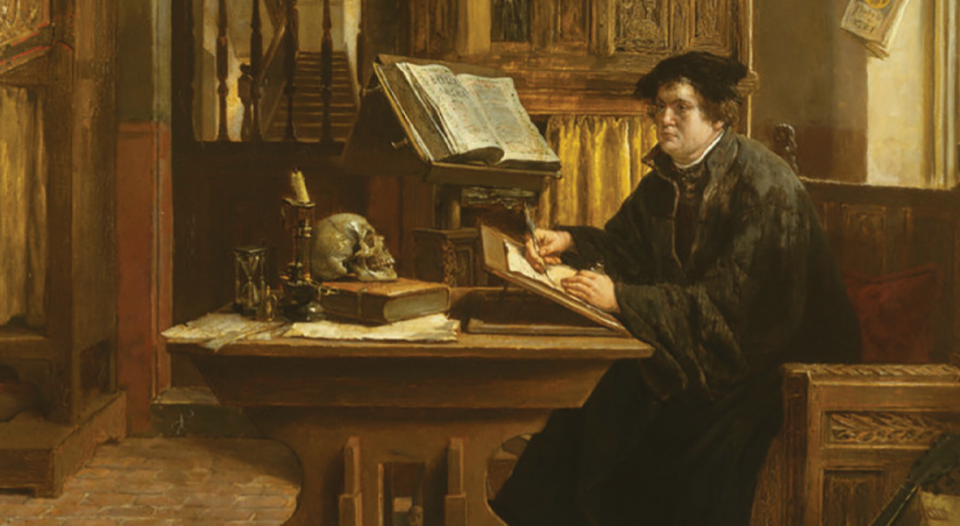Series editor’s note: Throughout 2024 “Deeper understandings” will feature teaching scholars of the ELCA reflecting on the many ways that Lutheran theology makes a difference for our daily lives. —Kristin Johnston Largen, president of Wartburg Theological Seminary, Dubuque, Iowa, on behalf of the ELCA’s seminaries
Scripture study is a very Lutheran thing to do.
Personal experiences with Scripture can vary greatly, from highly positive to very negative. Some people enjoy reading the Bible and can hardly imagine life without it. Others find it to be intimidating, riddled with obscure details and hard to make sense of. Some shy away from the Bible in response to fundamentalist approaches that demand a stifling literalism. I once asked a group of Lutherans what they like about our tradition and heard: “We like Jesus, not Scripture.” While I can appreciate the distinction, I don’t believe the two are opposed.
Truth be told, the study of Scripture is what started the Reformation. Martin Luther was a Bible professor. He took Scripture seriously. In doing so, he saw discrepancies between it and many church practices in his day. In response, he wrote the 95 Theses. When asked to recant his views a few years later before the Diet of Worms, he insisted: “Unless I am convicted by Scripture and plain reason … my conscience is captive to the Word of God. I cannot and I will not recant anything.”
The study of Scripture brought Protestant Christianity into existence.
The study of Scripture brought Protestant Christianity into existence.
Even more, Luther dreamed that everyone would have direct access to Scripture, to be able to read and understand it for themselves and to talk about it meaningfully using “plain reason.” As he wrote in his reforms of worship (Luther’s Works 53:14), “We profit by nothing as much as by the Word. For the whole Scripture shows that the Word should have free course among Christians.” He thought meditating on Scripture—including Bible-based summaries like the Small Catechism—should be a daily practice, since “we daily need God’s Word just as we do our daily bread” (Book of Concord, page 13). On his deathbed, he continued to praise Scripture as deserving a lifetime of devotion (LW 54:476).
I invite us to see regular Scripture study not only as a spiritual practice but as something that stands at the very heart of Lutheranism.
Scripture is complex
In the Lutheran tradition, faithful Scripture study is less about finding one-note answers and more about opening and deepening theological questions and learning. As such, it’s not a straightforward path with predictable results. Like prayer, it opens us up to hear God speak in new ways. Take Luther’s example:
- He questioned scriptural authorship claims, identified perceived errors and admitted confusion.
- He challenged interpretations that were harmful to real people.
- He refused rigid rules of interpretation because of Scripture’s complexity.
- He acknowledged that some Scripture passages conveyed Christ better than others.
- He quoted, recited, studied and revered Scripture to his dying day.
For Lutherans, Christ is both the source of Scripture and the story that Scripture wants to tell. As such, elevating Christ does not require putting Scripture down. Instead, Christ is our guide and focal lens for the faithful reading of Scripture. Instead of leaving us to judge what we like and don’t like about the Bible, this way of reading lets Scripture share its good news with us as a message grounded in the life, death and resurrection of Jesus.
Our ELCA constitution calls Scripture “the inspired Word of God and authoritative source and norm of our proclamation, faith, and life,” which holds accountable our tendencies to set ourselves up as lords of Scripture and to make Jesus look like ourselves.
For Lutherans, Christ is both the source of Scripture and the story that Scripture wants to tell.
Scripture is complex. Like our sacraments, it is both divine and human all at once. It deserves to be read with curiosity and care. And it points us to Christ. Luther called Scripture “the swaddling clothes and the manger in which Christ lies. … Simple and lowly are these swaddling clothes, but dear is the treasure, Christ, who lies in them” (LW 35:237).
Unfortunately, Scripture has indeed been used to harm, enslave and condemn. But evil uses of a good thing do not make it evil. Social reformer Frederick Douglass understood this. Eyeing interpretations condoning slavery, he asked: “What do we do in such a case? … Do you go and throw your Bible into the fire? … Do you sing out, ‘No union with the Bible!’ Do you declare that a thing is bad because it has been misused, abused, and made bad use of? … No! You press it to your bosom all the more closely; you read it all the more diligently; and prove from its pages that it is on the side of liberty—and not on the side of slavery” (The Frederick Douglass Papers: Series One: Speeches, Debates, and Interviews, Vol. 3 1855-63; ed. John Blassingame; Yale University Press, 1985).
There will always be harmful interpreters and interpretations that use God’s word to hurt rather than heal. But, as Douglass taught, this does not change the fact that Scripture is a gift from God and a message of good news of divine life for all.
Where to begin
Many people struggle to know where to begin with the spiritual practice of Scripture study. Here are some practical pointers:
- Don’t feel like you need to start at the beginning or read it “front to back” like you would a novel. This book is different.
- Start small, with something short. It doesn’t need to be Genesis or Matthew. Try books like Ruth, Mark or Philippians, for example.
- Read the Bible with others. Start a group if there isn’t one.
- Consult a pastor, deacon or mentor for guidance.
- Try updated, inclusive Bible translations and versions.
- Use resources such as study Bibles, commentaries and trustworthy online resources and apps. Ask questions about God and what God is up to while reading.
- Read in creative ways, using contemplative prayer practices.
I invite us to see regular Scripture study not only as a spiritual practice but as something at the very heart of Lutheranism.
On this last point, writing to his barber about how to pray, Luther encouraged meditating on Scripture and catechism portions through four “garlands” or areas for consideration:
- Thanksgiving. What in this passage moves me to give thanks?
- Instruction. What does the Spirit want me to learn from these words?
- Confession. What in this passage moves me to ask for forgiveness and to change?
- Prayer. What moves me to ask God for specific things (LW 43:193-211)?
I invite us to see regular Scripture study not only as a spiritual practice but as something at the very heart of Lutheranism. It may even start a Reformation in your own life and in the life of your Christian community.
Get this column in your inbox: Visit livinglutheran.org/subscribe and sign up for the free email digest “LL Stories.” Receive the digest weekly, biweekly or monthly, and select the categories that interest you. (“Deeper understandings” is a “Voices of faith” column.)





